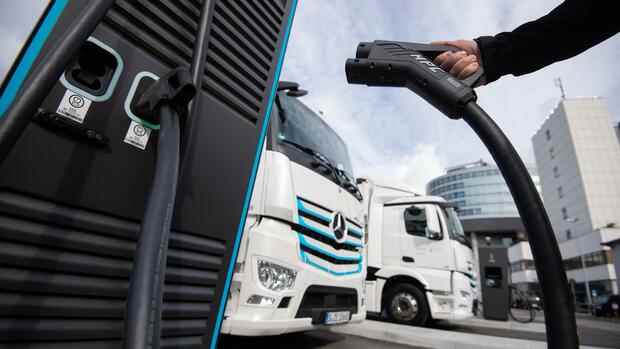Most electric trucks are unsuitable for long-distance driving.
(Photo: dpa)
Munich A liter of diesel cost exactly 2.14 euros on average in March. The ADAC has calculated that fuel has never been so expensive in Germany. In particular, freight forwarders and logisticians who calculate tightly are suffering from the increased fuel prices as a result of the Ukraine war. They are therefore increasingly turning away from combustion engines – not immediately, but at a previously unimagined speed.
This shows a previously unpublished study by the management consultancy Bain & Company, which is available to the Handelsblatt. According to this, many fleet managers in Europe want to convert almost half of their fleet to trucks that run on electricity or hydrogen by 2025. Around 60 percent of the almost 600 fleet managers surveyed in Germany, France, Great Britain and Spain would buy either purely electric trucks or at least hybrid semi-trailers in three years.
In Germany, only 28 percent of those surveyed are considering purchasing a diesel truck in the future. For comparison: in 2018, this was still an option for half of the fleet managers. “The diesel is gradually becoming obsolete, as its CO2 emissions have a negative impact on the customer’s climate balance,” states Jörg Gnamm, a partner at Bain and co-author of the study. “This also marks the end of the pilot phase for new drive concepts for truck manufacturers.”
Commercial vehicle suppliers without a wide range of alternative drive models will lose market share, predicts Gnamm. However, the ambitions of the fleet managers, who want to move away from diesel more and more quickly, not least because of the high fuel prices, could overwhelm the truck manufacturers. The Bain experts fear that they may not have the necessary capacities.
Top jobs of the day
Find the best jobs now and
be notified by email.
In fact, the industry currently has hardly any electric trucks on offer. For example, MAN has not yet mass-produced a single all-electric articulated lorry. And the heavy trucks from Daimler Truck and Volvo Truck, with maximum ranges of 400 kilometers, are unsuitable for long-distance journeys. But the long-distance heavy-duty truck business is the most lucrative segment for manufacturers.
Even the models of the new challengers such as the Tesla Semi or the Nikola Tre are currently not available in Europe and are at best in test fleets. Cheap competitors like Geely have already postponed their market launch to 2024.
Transport sector could “miss by a bang” on climate targets
“We want to make our contribution to climate protection, but we simply don’t have the technology in sufficient quantities at the moment,” criticizes Dirk Engelhardt, spokesman for the board of the Federal Association of Road Haulage, Logistics and Disposal (BGL). He fears that the domestic transport sector will initially “miss” its climate targets by a bang. Because in the next two to three years, due to the lack of supply, freight forwarders could continue to buy almost exclusively trucks that are powered by diesel or liquefied natural gas (LNG).
Engelhardt demands that both truck manufacturers and politicians must ensure reliable planning parameters so that the powertrain transition can progress quickly, at least from 2025. The total operating costs of electric trucks, the so-called total cost of ownership (TCO), would have to fall significantly through savings, subsidies or toll exemption. “We should create clear framework conditions so that nobody makes a bad investment that threatens their existence,” says Engelhardt. The manager represents the interests of 47,000 companies in the medium-sized German transport industry.
>> Read about this: Electric trucks will be cheaper than diesel models as early as 2025
The industry is suffering. “Companies invested in biodiesel technology years ago and failed miserably. Many companies have now invested in LNG technology and are on the brink of collapse,” explains Engelhardt. His industry simply cannot afford any more mistakes.
The Bain consultants recommend that the commercial vehicle manufacturers should counter the concerns of the logistics companies in view of the fact that the acquisition costs of electric trucks are currently almost twice as high as those of diesel trucks with subscription models or pay-per-use concepts. In any case, a good 42 percent of fleet managers would find it easier to decide to switch to electric semi-trailers if they only had to pay for the actual use.
Aftersales management & service: This is how truck manufacturers score with their customers
In addition, truck manufacturers could score points with their customers if they offered more services in view of the increasing technical complexity. Professional after-sales management is also particularly relevant. Almost 60 percent of the fleet managers surveyed by Bain would be interested in contracts that cover all services here – from maintenance to the replacement of wearing parts.
More: The truck no longer hums – this is how the electric Mercedes truck drives
